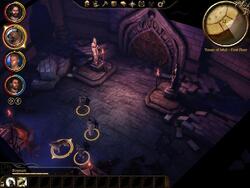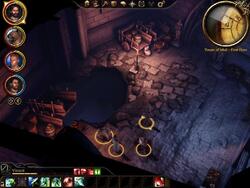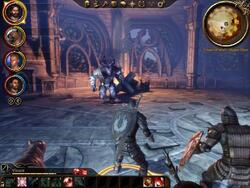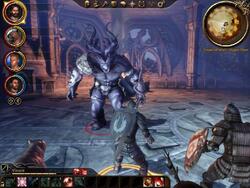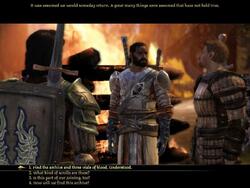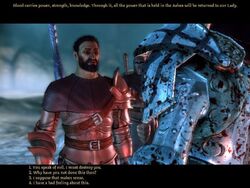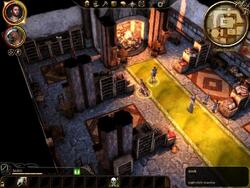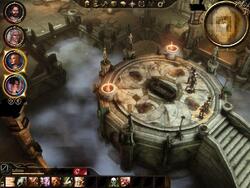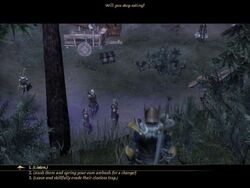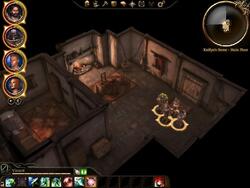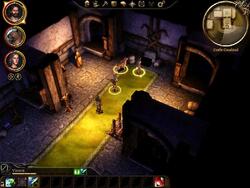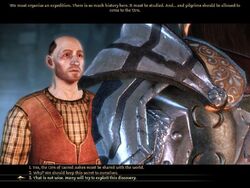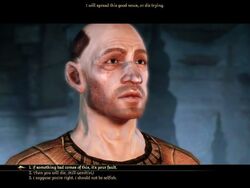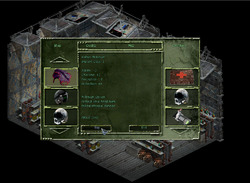Dragon Age: Choices and Consequences
Dragon Age: Choices and Consequences
Review - posted by DarkUnderlord on Sat 23 January 2010, 06:35:41
Tags: BioWare; Dragon Age: OriginsBy Vault Dweller
A long time ago, when the future of gaming was full of hope, fledgling developer Bioware pitched their RTS game to Interplay. Interplay gave Bioware their blessing, a DnD license, and suggested they throw in some stats to make the game an RPG. Thus, Baldur's Gate, the RTS of 1998, and Bioware, the premiere RPG maker, were born.
A decade later Bioware returned to its roots and its most successful series with Dragon Age, the spiritual successor to Baldur's Gate and an attempt to drop the DnD license for good. The problem with licenses is that although they do have a magical effect on sales, they are too expensive and too restrictive, since their owners take them too seriously, regardless of how idiotic some stuff is. So, let's start with the setting and see what Bioware did there.
The Setting & Story
I'll open this chapter with Dave Maldonado's (TORN lead designer) quote, since it describes Dragon Age setting design perfectly:
BOOM indeed. Unlike Black Isle, Bioware has managed to execute this plan flawlessly.
Dragon Age takes place in a very familiar land of humans, dwarves, elves, and blood-thirsty monsters. You'll find knights and mages, undead and ogres, dragons and giant spiders, werewolves and golems. It's a Tolkien-esque world aimed at creating instant recognition, familiarity, and comfort, if you're easily confused by unfamiliar worlds and anything original. The world is threatened by an equally generic Blight, represented by waves of annoying, orc-looking monsters who continue to be up to no good throughout the game, until you're ready to fight an anti-climatic battle, slay the dragon (come on, it's DRAGON age, what did you expect to kill in the end?), and save the world.
However, the world within these constraints of generic fantasy is very well designed and polished, and if you let it, will surprise you with its depth and the quality of its "unique takes and variants on some old familiar standards". To be honest, I hate all that elves and dwarves crap with passion, but I've genuinely enjoyed visiting different hubs and learning about different cultures, races, and customs, which led me to the conclusion that what I hate isn't the races but the cardboard cutout implementations - "these are dwarves, they live underground and like to fight; awesome or what?" Bioware definitely did a superb job there and raised the bar quite a lot.
The main quest (or it least the background) is less awe-inspiring, unfortunately. A long time ago mages had attempted to rival gods, which corrupted Heaven and created the first darkspawn. The darkspawn lurk underground, rarely rising to the surface, which makes it easy to ignore them as a minor and mindless inconvenience. However, every now and then the darkspawn manage to find and corrupt one of the ancient dragons sleeping underground, at which point the corrupted dragon becomes a general of the darkspawn, uniting them into a horde and leading it to the surface to raid and destroy. Such an event is called the Blight and it plays the same role as the Reapers do in Mass Effect: a horrible threat that doesn't make a whole lot of sense and lurks quietly behind the scene while you're busy convincing people who don't take the threat very seriously to act, in-between taking your time exploring and levelling up.
Then again, the main quest isn't about you stopping the darkspawn, much like Lord of the Rings isn't about destroying the ring and stopping Sauron. Dragon Age is about you dealing with different factions. From this point of view, the main quest is flexible enough to provide a goal and leaves you alone to sort things out.
You're a newly minted member of the Grey Wardens, an organization of great warriors, mages, and apparently rogues, dedicated to battling the darkspawn. On the surface they look like noble, cliché protectors of humanity, but you'll soon discover that the Wardens have more than one dimension and the word "good" may not be the best way to describe them. While they don't reach their full potential in the first game, the promise of beautiful and ambiguous things to come is definitely there.
An army of Wardens is slaughtered shortly after you become a Warden yourself, so your task is to build a new army and save the world. Armed with ancient treaties invoking the emergency powers of the Warden, you have to visit 4 different places to gather allies.
It's not the first time that Bioware sends you to 4 different hubs, but it's the first time it does it so well. For example, Knights of the Old Republic also offers you 4 different locations to explore and - while you're there - gives you 4 different sets of local problems to solve, but in KOTOR your goal is to find a specific object (the star map fragment), which makes the local problems a separate, flavour-only issue, completely unrelated to what the game is about. Dragon Age design, on the other hand, integrates local conflicts into the main quest, which works very well and brings us to the next point.
It's hard to find a better way to introduce a game world, its different races and customs than by tasking the player with seeking allies and offering several gameworld-affecting options, which, in essence, give you an opportunity to tweak the gameworld to your liking.
Can't overcome your dislike of the nature-dwelling, freedom-loving elves? Replace them with werewolves (by convincing the werewolves to wipe out the elves). Think that nothing good comes from meddling with magic? Let the Circle die in the tower and tell the templars to imprison the rest. Or, if you're a blood mage practicing the forbidden art, use this opportunity to wipe out both the templars and the Circle mages while they're weakened. A goal as flexible and generic as "gather allies" works perfectly with this design by encouraging you to understand your potential options, giving you the appropriate choices, and generating the logical outcomes and consequences.
The Character System
You get 6 attributes: Strength, Dexterity, Constitution, Willpower, Magic, Cunning. Basically, Charisma is gone, Wisdom is replaced by Willpower, which governs Mana and Stamina, making it - unfortunately, only in theory - a handy stat for all classes, and Intelligence is split into Magic (mage's primary stat) and Cunning (rogue's second best stat), which increases the efficiency of Rogue's talents, gives you a bonus to armor penetration - handy for low damage fighters, and is a primary persuasion stat.
You get 3 stat points when you level up. Unfortunately, the reasons to invest into more than 1 (rarely 2) stats are missing, while the combat talent requirements give you a very good reason to keep dumping points into your primary stat, which:
You get 3 basic classes: Warrior, Mage, Rogue. Each class can be upgraded into a specialization class at some point, 4 per each class. So, for example, your Warrior can become a Champion (party buffer), Templar (mage killer), Berserker (same as the DnD berserker - rage - more damage), or Reaver (crowd control), while your Mage can become an Arcane Warrior, Spirit Healer, Shapeshifter, or Blood Mage. Unlike DnD Prestige Classes, the specialization can only be learned from someone or something, which - again, in theory - creates very interesting scenarios and choices.
For example, you learn the Arcane Warrior specialization for your mage from an ancient spirit, locked in a phylactery (assuming you find it, of course). At some point the spirit offers to share his memories with you. If you accept, you learn from his memories (how very Torment) and unlock the specialization. To get the Reaver specialization, you must make a hard choice, which may not fit your character. Unfortunately, once a specialization is unlocked, it's yours forever and ever, courtesy of the achievement system, so you can do whatever it takes to get a desired specialization, reload an earlier save and use it without the associated costs. Some specializations can be learned from books, which makes it even easier to abuse the system.
Borrowing yet another page from DnD, Dragon Age separates abilities into talents and skills. Skills are Persuasion (called Coercion in DA for originality), Stealing, Trap-Making, Survival, Herbalism, Poison-Making, Combat Training and Combat Tactics. Talents are the strongest and best aspect of the character system. You get 4 different sub-specialization per class. Each specialization has 3 branches with 4 talents per branch, thus giving you 48 talents to play with.
Warriors, for example, get Dual Wielding, Two-Handed, Weapon & Shield, and Archery. Sub-specializations are very well balanced and overall very enjoyable to play. To put it simply, playing a fighter is FUN in Dragon Age, which is quite an achievement. In most games playing a fighter is a very passive "click on the target and watch your character swing his sword until his victim dies" experience. Dragon Age gives you a lot of different attacks and options, which let you quickly change your strategy and try different tactics against different enemies.
Mages get spells instead of talents. You get Primal (elemental), Creation, Spirit, and Entropy schools. While it makes no sense combining different specializations for warriors, it makes a lot of sense - and is a lot of fun - experimenting with different spell combinations. Creating a glyph barrier and then blasting the crowd trying to get in with a fireball works like a charm. Blizzard plus Tempest create a huge Electrical storm. Grease plus any Fire spell puts a large area on fire. Sleep plus Horror create Nightmare, etc. It's definitely a well-done and very enjoyable system.
The Combat system
The combat system is real-time with pause. It works well because the character system is solid and provides a lot of options. It has the potential to be one of the best RT systems, but the insane amount of combat filler ruins the combat and replayability. The non-filler fights are interesting and challenging, forcing you to understand the options and try different tactics. The combat filler, which sadly represents at least 80% of the combat encounters, isn't as exciting and can only be described as an exercise in tedium and patience.
I'd say that the decision to fill the game with generic combat was THE worst DA design decision, because it drowns truly memorable fights in an ocean of combat filler and makes replaying the game and making different choices - an undeniable strength of the game - so much harder. When I started playing the game I kept making mental notes about my next character's choices and admiring all the possibilities, but by the time I finished the game the combat price to try different non-combat things was way too much for me.
The combat system comes with auto-healing, auto-mana refill, auto-revival, and limited level scaling. Overall, they work well because of all the combat filler. With less combat, they would have been more noticeable and jarring, but considering how much stuff you have to kill, you'll be grateful that you don't need to heal/revive your party members every 5 min.
The auto-revival feature (fallen comrades will get up and pretend that nothing embarrassing happened once the fight is over - assuming that at least one of the party members has survived the fight) comes with the injury system, which is a clever design element that almost works. After each death or "loss of consciousness", an injury is added to the revived character. So, if your party members keep dying a lot, they would accumulate a large collection of various battle injuries that would make them a lot less effective, and ultimately, result in them dying a lot more and giving you a good reason not to treat death casually.
Unfortunately, the bloated primary stats make most penalties a minor inconvenience at best, and the irrelevant secondary stats make the corresponding penalties easy to ignore. For example, a warrior with a head trauma (willpower penalty), a cracked skull (cunning penalty), a concussion (magic penalty), and a torn jugular (constitution penalty) will NOT notice these effects at all. A warrior with several attack and damage penalties will be noticeably less effective though, especially against more challenging enemies. To make matters worse, a quick visit to the camp will heal all the injuries instantly.
So, while the idea has a lot of merit and could have replaced the death - reload system, it seems like the developers hesitated to go too far (in a disappointingly large number of areas), trying to make the game less challenging for the ever fucking retarded casual market, whose support, unfortunately, is mandatory, now that EA is in the picture. This hesitation constantly holds the game back and prevents many interesting ideas from reaching their full potential.
Role-playing
Role-playing (i.e. the ability to make decisions that affect both the player and the world around him) is the strongest and most enjoyable aspect of the game. Dragon Age does a better job of providing these options than any previous Bioware game, in fact any RPG since Arcanum, and rarely misses a chance to present you with an interesting choice to consider. Bold claims need proof, so let's take a moment to analyze these elements in a specific example: the Redcliffe-Urn questline.
As with all the other hubs, you go to Redcliffe in search of allies in your effort to repel the Blight. You know that Arl Eamon is a good bet for seeking support against Loghain, so off you go. When you arrive you find the villagers cowering in their homes, the castle is barred, no one knows what is going on and every night legions of the undead march out of the castle, killing all they find. They beg you to help.
Now, this wouldn't be the first time we've encountered villages in need of aid against marauding undead in an RPG, but Dragon Age does a good job in providing you with real options. You can choose to leave the town, returning later when the undead have killed all the villagers, which lets you skip the village defence sequence and go right to the castle. Should you choose to stay and defend, you have a number of options for organising the defence of the village, some of which aren't obvious. Sure, you can convince the blacksmith to come out of his shop and make the defenders weapons. But you can also kill him, loot his shop and distribute the goods to the defenders. There are a number of options if you explore (like finding oil for the weapons in the warehouse), and variations within those options.
Once that is all done, you get to fight. The battle is very challenging, especially on Hard. I played it 3 times: died the first time, barely survived the second time but lost everyone in the village and managed to save a handful of people on my third try after I considered and planned every move. Apparently, the game rewards you if you manage to defend the village without any casualties, but this feat would greatly surpass my tactical skills. Design-wise, it's pretty good and, if you go for "keep everyone alive" option, is on par with the hardest BG2 battles. The village is certainly a great example of taking a generic and seemingly boring "undead attack a village" setup and turning it into something interesting, challenging, and tactical.
So now you arrive at the castle, ready to find out what is going on. On entering the castle, you meet an imprisoned blood mage who is responsible for poisoning the Arl and is suspected of being behind the whole undead thing. The mage doesn't deny the charge, so you don't have to decide whether he's guilty or not. At this point the game offers you the first choice: kill him for his crimes, let him go or leave him imprisoned. If you played the Mage origin, the Blood mage is an old friend from your Origin story.
And, should you have helped the village, a group of knights is waiting at the gates, their assistance is helpful in the hard fight that follows in the castle courtyard and main hall, a nice consequence of your actions earlier.
When you finally reach the heart of the castle and the root cause of Redcliffe's troubles, you get presented with a problem that does a great job of illustrating one of the core foundations of the setting lore, that magic is a dangerous tool in the hands of the unprepared. The Arl's son was born with magical talents, you see. By law, he should have been sent off to the Circle for training, possibly death if he failed their tests. The Arl would have done his duty but his wife hid her son's abilities from him, secretly hired a tutor to train him in using and concealing them. What she didn't know was that this tutor was a blood mage, and hired by another to poison the Arl. When her husband gets sick she turns to her religious faith to seek a cure, but the boy takes a different path. With a child's naive desperation to save his father, he makes a deal with a powerful Desire Demon to save his life. But, in the process, the demon takes possession of his mind and soul, and leaves the father alive but unconscious. This demon then runs amok, using its power to slay the living and animate them as the undead, holding a mockery of a court in the castle.
This then, is the danger the lore speaks of: How even someone with good intentions can make a mistake when manipulating magic that can have disastrous consequences. That though the laws of the Circle and Chantry may seem harsh, they exist for good reason. The boy's mother may have only wanted to protect her child, but her choices brought doom on her family and people.
So now, depending on our choices up to this point, we're presented with 2 options on how to resolve the situation:
1) The simplest option is just to kill the boy.
2) Go into the Fade and challenge the demon for control of the boy's soul.
However, the second option is itself made up of many options, in fact it is possible to cut it off completely. To access the fade you need powerful magic, beyond a single mage. The imprisoned Blood Mage - if he's still around - can aid you with his blood magic, but only at the cost of someone's life. That someone being the mother, who chooses to sacrifice herself to save her son. Alternatively, you can go to the Circle of Magi for help, they have lyrium they can use to open the path to the Fade. However, depending on how you handle the Circle quests, the Circle may not exist to help you anymore. So it's possible, should you have destroyed the Circle and the blood mage, to have completely cut off that option. So:
1) Use Blood Magic to travel to the Fade, killing the mother in the process.
2) Go to the Circle for help, should they still exist.
Not only do you get to choose how to access the fade, you get to choose which mage goes in. If you're playing a mage, you can go. If you have a mage in the party, say Morrigan, they can go in. And if you got the Circle to help, you can convince the Archmagister to go in, since he owes you a favor. But the options don't stop there! Once in the fade, you face off with the Desire Demon. But, like all good demons of seduction, she attempts to bargain, to seduce. You can fight her for the boy, sure. But you can also convince her to leave him without a fight, if you're good at intimidation. She also attempts to offer you something in exchange for leaving her with control of the boy's soul. She'll make it look like she has left for a few years, long enough for you to resolve whatever you need to resolve. And in exchange, she will give you a... favour. If you're good enough at intimidation, you can convince her to leave the boy AND give you a favour, just for showing mercy in not destroying her. So your options at this point are:
1) Fight and kill the demon.
2) Intimidate her into leaving if you have the skill.
3) Let her keep the boy, but lay low for a few years, in exchange for either the secrets of Blood Magic, a talent point or even sex (she is a desire demon, after all).
4) As 3, but permanently surrendering the boy, if you have a high enough Coercion skill.
So, at every stage of this questline we see opportunity for choices with consequences, choices tied both to character skills and previous choices within the game (interconnected quests are a trademark of design excellence). The evil options are presented well, you aren't simply being evil for the sake of kicking sand in people's faces, you are given choices which appeal to opportunism and self-interest, not simple bullying.
Then there is the second phase of this plotline. Redcliffe is saved, but the Arl is still in a coma. Apparently, only the sacred ashes of a prophet - think the Holy Grail - have the power to heal him. Problem is they've misplaced the thing. In another Grail parallel, many knights have been sent to look for it, but they all failed miserably. Once again, it's up to you.
Your first step is finding a monk who has searched for the Urn his entire life. His home is in Denerim, but when you go there he isn't around. His servant is more than happy to tell you where his master is. Unfortunately, the REAL servant was killed by cultists, and the imposter is sending you into an ambush.
Fortunately, Bioware doesn't fall into the trap of forcing you to fall for the lie. You can either fall for it and go to the ambush site, thinking that that's where the monk is, or keep poking around until the imposter loses his patience and raises your suspicions that something is up. The monk can actually be found in a strange village, who sends you to the real location of the Urn, an ancient mountain temple filled with cultists who aren't fond of intruders and meddling kids.
After you fight your way through the temple and to the cult leader, in the very best traditions of role-playing the game offers you a choice (which isn't forced on you, btw; it's very easy to piss the leader off and get no choice at all). The cultists believe that the prophet (the one whose ashes are in the Urn) has been reborn in dragon form and that the ashes must be destroyed to complete the rebirth and transfer the prophet's power into the new body. Your reward is a rare but powerful specialization for your character (self interest again, instead of simply the option to be a cackling villain).
Unfortunately for the cultists, they can't get through the guardian for reasons that are explained in the game. Since you are not associated with the cultists yet, you may fool the guardian into letting you approach the ashes.
Destroying one of the most important relics in the setting is a hell of thing to do. Understandably, some party members will strongly object to this course of action. In fact, they will attack you and you'll lose them permanently. Of course, you can always just wipe out the cultists.
So now you have a significant choice, grounded in the lore of the setting and based around a vital element of the main plot (recruiting allies such as the Arl), with real, significant choices for your actions (permanent death of NPC companions.) But it doesn't end there.
So you are faced with the choice, not of altruistic good vs villainous evil, but also whether the end justifies the means. Do you agree with him, or do you kill a good man to keep the ashes' location a secret? Whether it is for your own gain or to prevent a far greater evil that may or may not happen, how you perceive this choice is important, and makes for a tough decision.
The only flaw is that they missed a great opportunity to let you choose to recruit the cultists and their dragon instead of the Arl and his infantry. The Arl plays a large part in the events that take place after, but it would have been a nice option. A harder option for the player, perhaps, but that's what the consequences are for.
So we can see that while in the past Bioware may have simply tasked you with recovering the Urn in a very linear, option-less way, the more flexible "pinch of ashes" objective easily opens up several interesting opportunities. This reinforces the point that in RPG design, a lot depends on how you lay out your game objectives. In this particular case, since you don't need the Urn, the option to destroy it and the option to decide whether or not to share it with the world are logical, fitting, and translate easily into meaningful endings.
Unfortunately, the filler combat once again gets in the way, creating long combat-filled gaps between decisions, which makes it harder to appreciate the main quest design.
And In Conclusion...
So, what do we get?
I think that it's a good way to sum up the game. Dragon Age has flaws, and if you focus on them, you'll miss a pretty good role-playing game. It's a Bioware game, which means that it has a certain set of features that Bioware has developed into a trademark design over the last decade. However, Bioware has managed to improve and evolve that design significantly, keeping the strong story-focus, while loading in a wide range of player choices and paths, which makes it the best Bioware RPG and one of the best role-playing games in years despite the flaws.
A long time ago, when the future of gaming was full of hope, fledgling developer Bioware pitched their RTS game to Interplay. Interplay gave Bioware their blessing, a DnD license, and suggested they throw in some stats to make the game an RPG. Thus, Baldur's Gate, the RTS of 1998, and Bioware, the premiere RPG maker, were born.
A decade later Bioware returned to its roots and its most successful series with Dragon Age, the spiritual successor to Baldur's Gate and an attempt to drop the DnD license for good. The problem with licenses is that although they do have a magical effect on sales, they are too expensive and too restrictive, since their owners take them too seriously, regardless of how idiotic some stuff is. So, let's start with the setting and see what Bioware did there.
The Setting & Story
I'll open this chapter with Dave Maldonado's (TORN lead designer) quote, since it describes Dragon Age setting design perfectly:
"The primary idea was to create a high-fantasy world (a prerequisite from day one - it's by far the most popular CRPG setting, despite the raucous cries of slightly jaded developers, reviewers, and some long-time gamers... sorry, guys) that began with a concept simple enough for everyone to get their head around. Then it was a matter of plent-o' twists, "tweaks for coolness," unique takes and variants on some old familiar standards, and BOOM: the World of Torn. In nearly all aspects of the world we've strived to create something familiar, yet different. I wanted there to be intriguing details and story for those interested in such, answers to those many questions so often ignored in other settings (e.g. "where the heck do all these orcs come from, and why are they all so angry?!"), background and reasons that made sense and were entertaining to discover and learn about... but most of all, I wanted Torn to be enthralling without having to be totally alien ("In Torn, dwarves live underwater and have tentacles and four eyes and shoot poison spines from their purple gill-sacks!"). I feel that a sense of familiarity and association is a powerful thing, and may be used to heighten a player's emotional experience in the game. If something can be tied into existing imagery (even if only subtly so) and be enhanced by or play off of pre-existing feelings and conceptions within the player, why throw away that extra bit of power at your disposal? In any case, we've tried to make these sundry little details and oddities pervade nearly every aspect of the game and setting (e.g. slightly altered monster stereotypes or player character racial characteristics)."
BOOM indeed. Unlike Black Isle, Bioware has managed to execute this plan flawlessly.
Dragon Age takes place in a very familiar land of humans, dwarves, elves, and blood-thirsty monsters. You'll find knights and mages, undead and ogres, dragons and giant spiders, werewolves and golems. It's a Tolkien-esque world aimed at creating instant recognition, familiarity, and comfort, if you're easily confused by unfamiliar worlds and anything original. The world is threatened by an equally generic Blight, represented by waves of annoying, orc-looking monsters who continue to be up to no good throughout the game, until you're ready to fight an anti-climatic battle, slay the dragon (come on, it's DRAGON age, what did you expect to kill in the end?), and save the world.
However, the world within these constraints of generic fantasy is very well designed and polished, and if you let it, will surprise you with its depth and the quality of its "unique takes and variants on some old familiar standards". To be honest, I hate all that elves and dwarves crap with passion, but I've genuinely enjoyed visiting different hubs and learning about different cultures, races, and customs, which led me to the conclusion that what I hate isn't the races but the cardboard cutout implementations - "these are dwarves, they live underground and like to fight; awesome or what?" Bioware definitely did a superb job there and raised the bar quite a lot.
The main quest (or it least the background) is less awe-inspiring, unfortunately. A long time ago mages had attempted to rival gods, which corrupted Heaven and created the first darkspawn. The darkspawn lurk underground, rarely rising to the surface, which makes it easy to ignore them as a minor and mindless inconvenience. However, every now and then the darkspawn manage to find and corrupt one of the ancient dragons sleeping underground, at which point the corrupted dragon becomes a general of the darkspawn, uniting them into a horde and leading it to the surface to raid and destroy. Such an event is called the Blight and it plays the same role as the Reapers do in Mass Effect: a horrible threat that doesn't make a whole lot of sense and lurks quietly behind the scene while you're busy convincing people who don't take the threat very seriously to act, in-between taking your time exploring and levelling up.
Then again, the main quest isn't about you stopping the darkspawn, much like Lord of the Rings isn't about destroying the ring and stopping Sauron. Dragon Age is about you dealing with different factions. From this point of view, the main quest is flexible enough to provide a goal and leaves you alone to sort things out.
You're a newly minted member of the Grey Wardens, an organization of great warriors, mages, and apparently rogues, dedicated to battling the darkspawn. On the surface they look like noble, cliché protectors of humanity, but you'll soon discover that the Wardens have more than one dimension and the word "good" may not be the best way to describe them. While they don't reach their full potential in the first game, the promise of beautiful and ambiguous things to come is definitely there.
An army of Wardens is slaughtered shortly after you become a Warden yourself, so your task is to build a new army and save the world. Armed with ancient treaties invoking the emergency powers of the Warden, you have to visit 4 different places to gather allies.
It's not the first time that Bioware sends you to 4 different hubs, but it's the first time it does it so well. For example, Knights of the Old Republic also offers you 4 different locations to explore and - while you're there - gives you 4 different sets of local problems to solve, but in KOTOR your goal is to find a specific object (the star map fragment), which makes the local problems a separate, flavour-only issue, completely unrelated to what the game is about. Dragon Age design, on the other hand, integrates local conflicts into the main quest, which works very well and brings us to the next point.
It's hard to find a better way to introduce a game world, its different races and customs than by tasking the player with seeking allies and offering several gameworld-affecting options, which, in essence, give you an opportunity to tweak the gameworld to your liking.
Can't overcome your dislike of the nature-dwelling, freedom-loving elves? Replace them with werewolves (by convincing the werewolves to wipe out the elves). Think that nothing good comes from meddling with magic? Let the Circle die in the tower and tell the templars to imprison the rest. Or, if you're a blood mage practicing the forbidden art, use this opportunity to wipe out both the templars and the Circle mages while they're weakened. A goal as flexible and generic as "gather allies" works perfectly with this design by encouraging you to understand your potential options, giving you the appropriate choices, and generating the logical outcomes and consequences.
The Character System
You get 6 attributes: Strength, Dexterity, Constitution, Willpower, Magic, Cunning. Basically, Charisma is gone, Wisdom is replaced by Willpower, which governs Mana and Stamina, making it - unfortunately, only in theory - a handy stat for all classes, and Intelligence is split into Magic (mage's primary stat) and Cunning (rogue's second best stat), which increases the efficiency of Rogue's talents, gives you a bonus to armor penetration - handy for low damage fighters, and is a primary persuasion stat.
You get 3 stat points when you level up. Unfortunately, the reasons to invest into more than 1 (rarely 2) stats are missing, while the combat talent requirements give you a very good reason to keep dumping points into your primary stat, which:
- creates bloated stats that no longer make any sense;
- makes stat bonuses pointless (for example, Champion class upgrade for your Warrior gives you +2 to Willpower and +1 to Cunning; in a more balanced system these bonuses would have made sense - if you had 10 points in Str, 5 in Willpower, and 6 in Cunning, upgrading to Champion would have plugged holes in your build and significantly increased secondary stats, but in a system with Str 40, Willpower 10, Cunning 10, increasing Cunning by 1 gives you no benefits whatsoever);
- makes the injury system meaningless as in most cases it gives easy to ignore penalties
You get 3 basic classes: Warrior, Mage, Rogue. Each class can be upgraded into a specialization class at some point, 4 per each class. So, for example, your Warrior can become a Champion (party buffer), Templar (mage killer), Berserker (same as the DnD berserker - rage - more damage), or Reaver (crowd control), while your Mage can become an Arcane Warrior, Spirit Healer, Shapeshifter, or Blood Mage. Unlike DnD Prestige Classes, the specialization can only be learned from someone or something, which - again, in theory - creates very interesting scenarios and choices.
For example, you learn the Arcane Warrior specialization for your mage from an ancient spirit, locked in a phylactery (assuming you find it, of course). At some point the spirit offers to share his memories with you. If you accept, you learn from his memories (how very Torment) and unlock the specialization. To get the Reaver specialization, you must make a hard choice, which may not fit your character. Unfortunately, once a specialization is unlocked, it's yours forever and ever, courtesy of the achievement system, so you can do whatever it takes to get a desired specialization, reload an earlier save and use it without the associated costs. Some specializations can be learned from books, which makes it even easier to abuse the system.
Borrowing yet another page from DnD, Dragon Age separates abilities into talents and skills. Skills are Persuasion (called Coercion in DA for originality), Stealing, Trap-Making, Survival, Herbalism, Poison-Making, Combat Training and Combat Tactics. Talents are the strongest and best aspect of the character system. You get 4 different sub-specialization per class. Each specialization has 3 branches with 4 talents per branch, thus giving you 48 talents to play with.
Warriors, for example, get Dual Wielding, Two-Handed, Weapon & Shield, and Archery. Sub-specializations are very well balanced and overall very enjoyable to play. To put it simply, playing a fighter is FUN in Dragon Age, which is quite an achievement. In most games playing a fighter is a very passive "click on the target and watch your character swing his sword until his victim dies" experience. Dragon Age gives you a lot of different attacks and options, which let you quickly change your strategy and try different tactics against different enemies.
Mages get spells instead of talents. You get Primal (elemental), Creation, Spirit, and Entropy schools. While it makes no sense combining different specializations for warriors, it makes a lot of sense - and is a lot of fun - experimenting with different spell combinations. Creating a glyph barrier and then blasting the crowd trying to get in with a fireball works like a charm. Blizzard plus Tempest create a huge Electrical storm. Grease plus any Fire spell puts a large area on fire. Sleep plus Horror create Nightmare, etc. It's definitely a well-done and very enjoyable system.
The Combat system
The combat system is real-time with pause. It works well because the character system is solid and provides a lot of options. It has the potential to be one of the best RT systems, but the insane amount of combat filler ruins the combat and replayability. The non-filler fights are interesting and challenging, forcing you to understand the options and try different tactics. The combat filler, which sadly represents at least 80% of the combat encounters, isn't as exciting and can only be described as an exercise in tedium and patience.
I'd say that the decision to fill the game with generic combat was THE worst DA design decision, because it drowns truly memorable fights in an ocean of combat filler and makes replaying the game and making different choices - an undeniable strength of the game - so much harder. When I started playing the game I kept making mental notes about my next character's choices and admiring all the possibilities, but by the time I finished the game the combat price to try different non-combat things was way too much for me.
The combat system comes with auto-healing, auto-mana refill, auto-revival, and limited level scaling. Overall, they work well because of all the combat filler. With less combat, they would have been more noticeable and jarring, but considering how much stuff you have to kill, you'll be grateful that you don't need to heal/revive your party members every 5 min.
The auto-revival feature (fallen comrades will get up and pretend that nothing embarrassing happened once the fight is over - assuming that at least one of the party members has survived the fight) comes with the injury system, which is a clever design element that almost works. After each death or "loss of consciousness", an injury is added to the revived character. So, if your party members keep dying a lot, they would accumulate a large collection of various battle injuries that would make them a lot less effective, and ultimately, result in them dying a lot more and giving you a good reason not to treat death casually.
Unfortunately, the bloated primary stats make most penalties a minor inconvenience at best, and the irrelevant secondary stats make the corresponding penalties easy to ignore. For example, a warrior with a head trauma (willpower penalty), a cracked skull (cunning penalty), a concussion (magic penalty), and a torn jugular (constitution penalty) will NOT notice these effects at all. A warrior with several attack and damage penalties will be noticeably less effective though, especially against more challenging enemies. To make matters worse, a quick visit to the camp will heal all the injuries instantly.
So, while the idea has a lot of merit and could have replaced the death - reload system, it seems like the developers hesitated to go too far (in a disappointingly large number of areas), trying to make the game less challenging for the ever fucking retarded casual market, whose support, unfortunately, is mandatory, now that EA is in the picture. This hesitation constantly holds the game back and prevents many interesting ideas from reaching their full potential.
Role-playing
Role-playing (i.e. the ability to make decisions that affect both the player and the world around him) is the strongest and most enjoyable aspect of the game. Dragon Age does a better job of providing these options than any previous Bioware game, in fact any RPG since Arcanum, and rarely misses a chance to present you with an interesting choice to consider. Bold claims need proof, so let's take a moment to analyze these elements in a specific example: the Redcliffe-Urn questline.
As with all the other hubs, you go to Redcliffe in search of allies in your effort to repel the Blight. You know that Arl Eamon is a good bet for seeking support against Loghain, so off you go. When you arrive you find the villagers cowering in their homes, the castle is barred, no one knows what is going on and every night legions of the undead march out of the castle, killing all they find. They beg you to help.
Now, this wouldn't be the first time we've encountered villages in need of aid against marauding undead in an RPG, but Dragon Age does a good job in providing you with real options. You can choose to leave the town, returning later when the undead have killed all the villagers, which lets you skip the village defence sequence and go right to the castle. Should you choose to stay and defend, you have a number of options for organising the defence of the village, some of which aren't obvious. Sure, you can convince the blacksmith to come out of his shop and make the defenders weapons. But you can also kill him, loot his shop and distribute the goods to the defenders. There are a number of options if you explore (like finding oil for the weapons in the warehouse), and variations within those options.
Once that is all done, you get to fight. The battle is very challenging, especially on Hard. I played it 3 times: died the first time, barely survived the second time but lost everyone in the village and managed to save a handful of people on my third try after I considered and planned every move. Apparently, the game rewards you if you manage to defend the village without any casualties, but this feat would greatly surpass my tactical skills. Design-wise, it's pretty good and, if you go for "keep everyone alive" option, is on par with the hardest BG2 battles. The village is certainly a great example of taking a generic and seemingly boring "undead attack a village" setup and turning it into something interesting, challenging, and tactical.
So now you arrive at the castle, ready to find out what is going on. On entering the castle, you meet an imprisoned blood mage who is responsible for poisoning the Arl and is suspected of being behind the whole undead thing. The mage doesn't deny the charge, so you don't have to decide whether he's guilty or not. At this point the game offers you the first choice: kill him for his crimes, let him go or leave him imprisoned. If you played the Mage origin, the Blood mage is an old friend from your Origin story.
And, should you have helped the village, a group of knights is waiting at the gates, their assistance is helpful in the hard fight that follows in the castle courtyard and main hall, a nice consequence of your actions earlier.
When you finally reach the heart of the castle and the root cause of Redcliffe's troubles, you get presented with a problem that does a great job of illustrating one of the core foundations of the setting lore, that magic is a dangerous tool in the hands of the unprepared. The Arl's son was born with magical talents, you see. By law, he should have been sent off to the Circle for training, possibly death if he failed their tests. The Arl would have done his duty but his wife hid her son's abilities from him, secretly hired a tutor to train him in using and concealing them. What she didn't know was that this tutor was a blood mage, and hired by another to poison the Arl. When her husband gets sick she turns to her religious faith to seek a cure, but the boy takes a different path. With a child's naive desperation to save his father, he makes a deal with a powerful Desire Demon to save his life. But, in the process, the demon takes possession of his mind and soul, and leaves the father alive but unconscious. This demon then runs amok, using its power to slay the living and animate them as the undead, holding a mockery of a court in the castle.
This then, is the danger the lore speaks of: How even someone with good intentions can make a mistake when manipulating magic that can have disastrous consequences. That though the laws of the Circle and Chantry may seem harsh, they exist for good reason. The boy's mother may have only wanted to protect her child, but her choices brought doom on her family and people.
So now, depending on our choices up to this point, we're presented with 2 options on how to resolve the situation:
1) The simplest option is just to kill the boy.
2) Go into the Fade and challenge the demon for control of the boy's soul.
However, the second option is itself made up of many options, in fact it is possible to cut it off completely. To access the fade you need powerful magic, beyond a single mage. The imprisoned Blood Mage - if he's still around - can aid you with his blood magic, but only at the cost of someone's life. That someone being the mother, who chooses to sacrifice herself to save her son. Alternatively, you can go to the Circle of Magi for help, they have lyrium they can use to open the path to the Fade. However, depending on how you handle the Circle quests, the Circle may not exist to help you anymore. So it's possible, should you have destroyed the Circle and the blood mage, to have completely cut off that option. So:
1) Use Blood Magic to travel to the Fade, killing the mother in the process.
2) Go to the Circle for help, should they still exist.
Not only do you get to choose how to access the fade, you get to choose which mage goes in. If you're playing a mage, you can go. If you have a mage in the party, say Morrigan, they can go in. And if you got the Circle to help, you can convince the Archmagister to go in, since he owes you a favor. But the options don't stop there! Once in the fade, you face off with the Desire Demon. But, like all good demons of seduction, she attempts to bargain, to seduce. You can fight her for the boy, sure. But you can also convince her to leave him without a fight, if you're good at intimidation. She also attempts to offer you something in exchange for leaving her with control of the boy's soul. She'll make it look like she has left for a few years, long enough for you to resolve whatever you need to resolve. And in exchange, she will give you a... favour. If you're good enough at intimidation, you can convince her to leave the boy AND give you a favour, just for showing mercy in not destroying her. So your options at this point are:
1) Fight and kill the demon.
2) Intimidate her into leaving if you have the skill.
3) Let her keep the boy, but lay low for a few years, in exchange for either the secrets of Blood Magic, a talent point or even sex (she is a desire demon, after all).
4) As 3, but permanently surrendering the boy, if you have a high enough Coercion skill.
So, at every stage of this questline we see opportunity for choices with consequences, choices tied both to character skills and previous choices within the game (interconnected quests are a trademark of design excellence). The evil options are presented well, you aren't simply being evil for the sake of kicking sand in people's faces, you are given choices which appeal to opportunism and self-interest, not simple bullying.
Then there is the second phase of this plotline. Redcliffe is saved, but the Arl is still in a coma. Apparently, only the sacred ashes of a prophet - think the Holy Grail - have the power to heal him. Problem is they've misplaced the thing. In another Grail parallel, many knights have been sent to look for it, but they all failed miserably. Once again, it's up to you.
Your first step is finding a monk who has searched for the Urn his entire life. His home is in Denerim, but when you go there he isn't around. His servant is more than happy to tell you where his master is. Unfortunately, the REAL servant was killed by cultists, and the imposter is sending you into an ambush.
Fortunately, Bioware doesn't fall into the trap of forcing you to fall for the lie. You can either fall for it and go to the ambush site, thinking that that's where the monk is, or keep poking around until the imposter loses his patience and raises your suspicions that something is up. The monk can actually be found in a strange village, who sends you to the real location of the Urn, an ancient mountain temple filled with cultists who aren't fond of intruders and meddling kids.
After you fight your way through the temple and to the cult leader, in the very best traditions of role-playing the game offers you a choice (which isn't forced on you, btw; it's very easy to piss the leader off and get no choice at all). The cultists believe that the prophet (the one whose ashes are in the Urn) has been reborn in dragon form and that the ashes must be destroyed to complete the rebirth and transfer the prophet's power into the new body. Your reward is a rare but powerful specialization for your character (self interest again, instead of simply the option to be a cackling villain).
Unfortunately for the cultists, they can't get through the guardian for reasons that are explained in the game. Since you are not associated with the cultists yet, you may fool the guardian into letting you approach the ashes.
Destroying one of the most important relics in the setting is a hell of thing to do. Understandably, some party members will strongly object to this course of action. In fact, they will attack you and you'll lose them permanently. Of course, you can always just wipe out the cultists.
So now you have a significant choice, grounded in the lore of the setting and based around a vital element of the main plot (recruiting allies such as the Arl), with real, significant choices for your actions (permanent death of NPC companions.) But it doesn't end there.
Just when you think that the quest is over, the scholar-monk presents you with the final choice. He is a true believer, he's dedicated his life to finding that Urn. Now that he has, he wants to let the whole world know where the ashes are. He doesn't think of the potential consequences that will follow such a decision.So you are faced with the choice, not of altruistic good vs villainous evil, but also whether the end justifies the means. Do you agree with him, or do you kill a good man to keep the ashes' location a secret? Whether it is for your own gain or to prevent a far greater evil that may or may not happen, how you perceive this choice is important, and makes for a tough decision.
The only flaw is that they missed a great opportunity to let you choose to recruit the cultists and their dragon instead of the Arl and his infantry. The Arl plays a large part in the events that take place after, but it would have been a nice option. A harder option for the player, perhaps, but that's what the consequences are for.
So we can see that while in the past Bioware may have simply tasked you with recovering the Urn in a very linear, option-less way, the more flexible "pinch of ashes" objective easily opens up several interesting opportunities. This reinforces the point that in RPG design, a lot depends on how you lay out your game objectives. In this particular case, since you don't need the Urn, the option to destroy it and the option to decide whether or not to share it with the world are logical, fitting, and translate easily into meaningful endings.
Unfortunately, the filler combat once again gets in the way, creating long combat-filled gaps between decisions, which makes it harder to appreciate the main quest design.
And In Conclusion...
So, what do we get?
- A generic but well designed, well thought-through world;
- A generic threat that's merely a background; the game is more about you dealing with different factions than about you stopping the Blight;
- Very detailed character system with some flaws;
- Tactical combat wasted on filler encounters;
- Standard party members setup with all the banter and drama you can expect, but this time you can kill a lot more party members, which is a must-have feature in a Bioware game;
- Truly excellent quest choices and options sandwiched between a linear and not overly interesting beginning and an anticlimatic ending.
"Really it seems to boil down to this: Dragon Age has undeniable flaws, some glaring, some less-so. To some, the truly brilliant moments easily outshine those flaws. To others, the brilliant moments aren't brilliant enough, or don't happen often enough, so the flaws stand-out more and bring the entire experience down. I think both perspectives are perfectly legitimate, and, like so many other things, really boil down to personal preference. And really, the "undeniable flaws with brilliant moments/features/etc." describes pretty much every great RPG I've ever played."
I think that it's a good way to sum up the game. Dragon Age has flaws, and if you focus on them, you'll miss a pretty good role-playing game. It's a Bioware game, which means that it has a certain set of features that Bioware has developed into a trademark design over the last decade. However, Bioware has managed to improve and evolve that design significantly, keeping the strong story-focus, while loading in a wide range of player choices and paths, which makes it the best Bioware RPG and one of the best role-playing games in years despite the flaws.
There are 26 comments on Dragon Age: Choices and Consequences









